|
First Britannia, then Gothia, where will the revolution spread next?
|
|
|
|

|
| # ? Apr 24, 2024 19:44 |
|
It's and early Christmas miracle!
|
|
|
|
Funny, I've actually been playing through an old save of the CK2 mod, glad to see it back
|
|
|
|
We're back, baby
|
|
|
|
I'm always glad to see this back!
|
|
|
|
idhrendur posted:I'm always glad to see this back! 
|
|
|
|
GLORY TO THE PEOPLE!
|
|
|
|
Workers of the world, unite! Let us spread the revolution internationally!!
|
|
|
|
And now another MegaLP falls into the clutches of Socialism and Communism.
|
|
|
|
I mean, to be honest unless you sorta game the system by tapping the reform button EVERY time it comes up (and even then sometimes), you will get swamped with rebels. And suppressing them with military might sometimes isn't really enough and it's detrimental since you're killing your own pops (which generate wealth and military and industry and everything) for you. So yeah. If you don't bend, you break. And when you break, you break from monarchy to republic, and republic to socialist/communist (or fascist if you're late enough game and don't fight against them/win your cores back).
|
|
|
|
Lateinshowing posted:I mean, to be honest unless you sorta game the system by tapping the reform button EVERY time it comes up (and even then sometimes), you will get swamped with rebels. And suppressing them with military might sometimes isn't really enough and it's detrimental since you're killing your own pops (which generate wealth and military and industry and everything) for you. This is why world population is notably reduced in my megacampaign at the point of HoI4 conversion.
|
|
|
|
Xelkelvos posted:And now another MegaLP falls into the clutches of Socialism and Communism. Looks like Anarchism actually  The tool-tip says the Socialists won but the ruling party are the Proudhon-style Anarchists. Edit: Also really glad to see this back, thought for certain it was dead. Eleven Eleven fucked around with this message at 05:48 on Dec 13, 2021 |
|
|
|
Eleven Eleven posted:Looks like Anarchism actually
|
|
|
|
Xelkelvos posted:And now another MegaLP falls into the clutches of Socialism and Communism. the thing about Vicky 2 is that sometimes it decides "gently caress you you are [insert ideology here] now" and there's basically nothing you can do if you aren't totally prepared for a literal million rebels rising up
|
|
|
|
That's the fun part, even if you are somewhat familiar with the game. Am I going to experience an economic collapse? Am I going to experience another revolution? Oh God, did China industrialize somehow? Nobody knows, and that's what makes it fun!
|
|
|
|
gothLP resurrection: the surprise latecomer hit of 2021 very excited for anarchist goths
|
|
|
|
|
Holy poo poo I remember voting in this thread in the Before times. Madness.
|
|
|
|
Hellioning posted:Holy poo poo I remember voting in this thread in the Before times. Madness. This started in 2015???
|
|
|
|
As a mega-LP, it's also notable for starting before CK2 and in an entirely unrelated game. It has one of my favorite, most memorable lines in any LP based on this deep history: "What Goth would dream of sacking Rome?"
|
|
|
|
RabidWeasel posted:This started in 2015??? Between this and the Byzantine lets play that started in 2014, these megacampaigns can come back from the loving dead
|
|
|
|
I thought getting hired by Paradox themselves was a surefire way to kill of an LP, but it appears I'm wrong.
|
|
|
|
It's a subtle marketing campaign to push awareness for Vicky 3
|
|
|
|
|
dervival posted:I thought getting hired by Paradox themselves was a surefire way to kill of an LP, but it appears I'm wrong. get ready for AzeriLP in HoI5
|
|
|
|
Vaguely related: https://forum.paradoxplaza.com/forum/developer-diary/victoria-3-dev-diary-28-flags.1503444/ Hell yeah ofaloaf gets a dev diary and naturally it's about flags
|
|
|
|
|
I just read through all of this and I'm glad it's still going on! Communist Goths, who would of thought? I love these types of MegaLPs, lots of interesting What-ifs!
|
|
|
|
Chapter 83: The State of Anarchy 1885-1891 Following the Revolution of '85, a coalition of anarchists, backed by other socialist groups, found themselves in control of a government. As theory ran headlong into practice, the anarchists attempted to reconcile their ideals with the guiding ideologies of their revolutionary peers and the clash of theory and practice, and forge a system that could bring peace and anarchy to all. 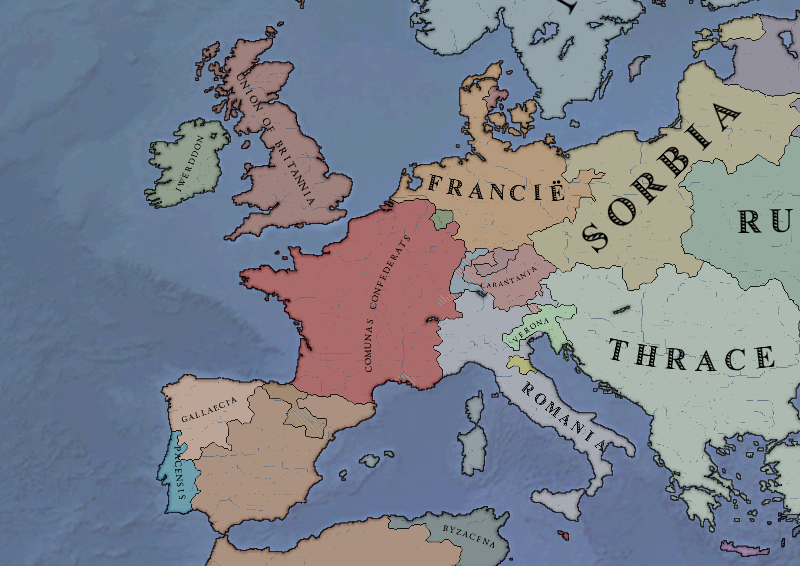 On October 2nd, 1885, Gothic revolutionaries proclaimed the end of the Republic of Gothia and the establishment of the Council of Workers' Communes, or Comunas Confederats dels Trabalhars. The CCT, forged in the fires of a great invasion by the Franks, was composed of a coalition of anarchists, communists, trade unionists and various militant socialists dedicated to both overthrowing the old republic and fending off the Frankish incursion. Although the anarchists held a majority of posts in the revolutionary councils, they did not have the absolute support even among the revolutionaries, much less the country at large, and found themselves in charge of a country rather than a stateless society. 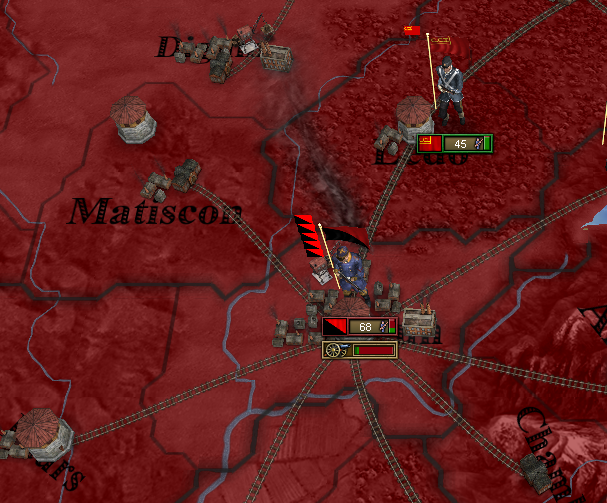 One of the first and most uncomfortable challenges that faced the anarchists were communists. While many had joined the greater socialist uprising, a smaller group of communists had conducted their fighting separately, declaring that they sought nothing less than the absolute takeover of power so that they could implement socialism fully, unimpeded by any surviving bourgeois remnants mucking up the gears of collective government. While the greater mass of revolutionaries laid down their arms after the October 2nd declaration, the communists remained armed and in the capital. Remnants of the republican Gothic army, too, remained nearby to the north and south of the capital, although they proclaimed their loyalty to the cause of the CCT. The solution for the government was obvious.  It was the most blatant breach of anarchist principles, and the revolutionaries had committed to it barely a month after they had declared victory in the revolution. There were plenty of excuses - the radical communists would have destroyed the freedom the anarchists had just fought so hard to secure, the soldiers had volunteered to continue their duties, one of the communist leaders had expressed an incorrect opinion in a periodical the week prior – but the fact was that the anarchists had compromised themselves almost immediately after the revolution had been won. 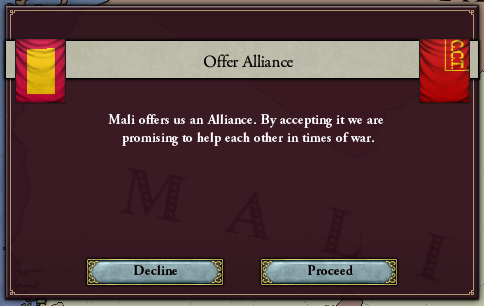 To the consternation of the more radical of the anarchists, other states - there was no denying Goths had not managed to wither the state away within a month of the collapse of the republic – treated the CCT as if it was a straightforward continuation of Gothic government, and prepared treaties of friendship. Foreign affairs were not largely under anarchist influence – union figures had taken an early interest in the continuation of Gothic trade and had assumed many of the responsibilities of a foreign ministry – and so early alliance offers and trade deals from the likes of the Kingdom of Mali were happily taken up, despite objections from the most ardent ideologues. 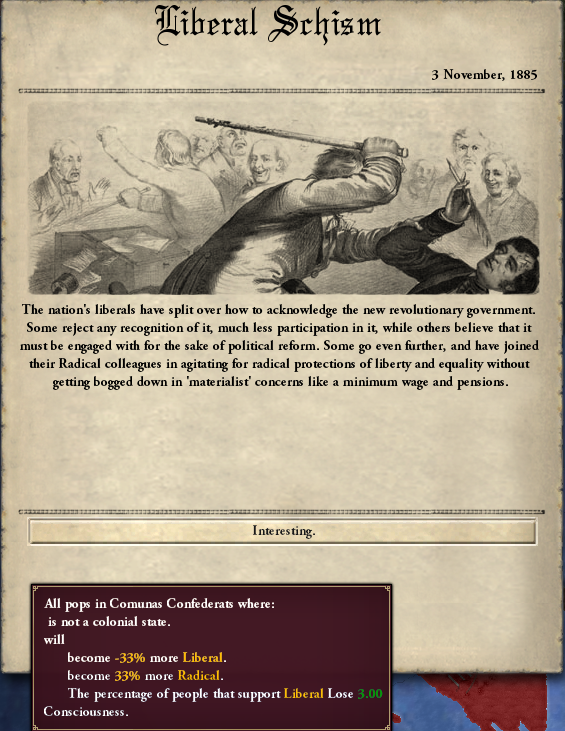 Meanwhile, the rapid organization of the CCT gave a second blow to Gothic loyalists to the old government. The belief among many of the old republic's supporters had been that the revolutionary government would last weeks, maybe even days, after its declaration. When this self-apparent truth failed to become true, it shattered morale among Gothia's liberals. Some resigned themselves to the new order – which they were welcomed to join, according to anarchist ideologues – while others quit politics entirely.  Similarly, conservatism in Gothia underwent a metamorphosis, as moderate conservatives tended to either refuse to engage with the political scene established by the revolutionary CCT, or radicalize into reactionaries intent on nothing but the overthrow of the commune.  The third political change was overseas, in Gothia's colonies. News of the revolution itself took considerable time to reach African ports, and even then colonial governors, still generally appointees from the republic, censored what they could. Even so, the rhetoric of anarchists began spreading within the African colonies, and laborers in the port towns – the one place where the model of European society had been stamped the hardest – began organizing themselves despite warnings from the colonial authorities. Violent clashes heralded a new era in Gothic Africa.  The Confederated Communes as of yet had no 'national' policy in most regards – Anarchists, the primary architects of early CCT institutions, insisted on using overlapping federations and unions of workers, farmers, and whatever likeminded people were interested in a particular subject – but even within this jumble, progressive policies continued to emerge and spread nationally. Anarchists scored an early success with the 1886 introduction of the 'Modern School' education model, which was rapidly disseminated among the Gothic communes. In this model, exams and grades were dropped, and the traditional classroom was to be replaced with workshops and laboratories, where students would learn more through hands-on experiences rather than textbooks. This model was only hesitantly adopted in the first years of its inception, but as the CCT gathered its strength the education movement gained more and more traction. 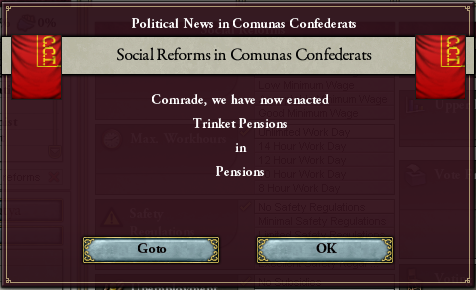 Work also continued to progress in reforming Gothia's lackluster social institutions. By November of 1886, a majority of communes had begun implementing a pension system to support older Goths. To begin with, this was a very weak system, but it was only the beginning.  Two models of healthcare emerged in the revolutionary '80s: provincial 'council' healthcare, and municipal 'cooperative' healthcare. 'Council' healthcare was built around ad hoc local councils, comprised of villages and rural communities meeting together to determine what was lacking and sending requests for help to neighboring areas. Formal medical institutions in the countryside were often lacking, so the basis for much rural healthcare were commune-supported doctors running a circuit of house calls, backed by local apothecaries who could produce simple tinctures, powders, and other medicines, but complicated surgeries were difficult to perform, and vaccines were hard to procure while national distribution networks were still being rebuilt during the formative years of the CCT. Urban 'cooperative' healthcare, by contrast, was built around a restructuring of physical medical institutions, capable of dealing with far more grave medical emergencies at the cost of covering a far smaller area than provincial doctors traveling a circuit. Major pre-revolutionary hospitals, such as the venerable St. Irenaiu's in the capital of Liyun, had long been managed by municipal governments, but in the anarchist spirit of the '80s these hospitals were reorganized as cooperatives run by their own professionals, with elected representatives sent to the municipal councils they had once answered to. In the countryside, healthcare reforms saw local associations take the lead to support medical practitioners and provide them with whatever resources could be mustered, while in the cities, healthcare workers themselves seized control of both medical care and the decision-making institutions that guided healthcare policy. 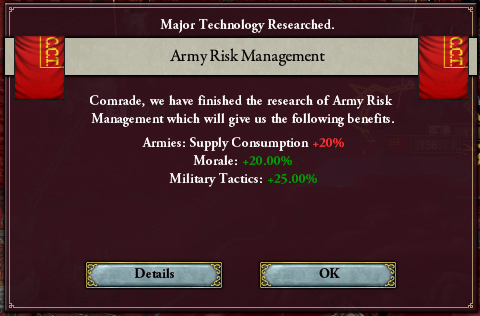 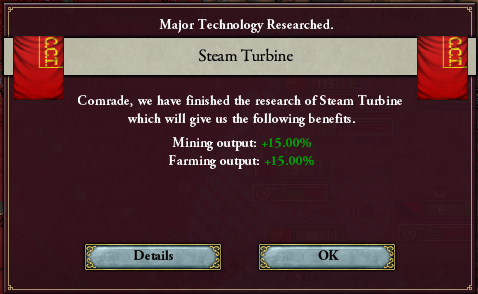 While the foundations of Gothia's future intellectual life were being laid down, the nation was far more interested in the immediate benefits of military and industrial development. With the first gasps of peace in the land, communes began purchasing new power plants, upgrading old mining equipment and acquiring new traction engines to work farmland.  Following up on the first pensions and communal healthcare systems, 1887 saw a proliferation of new cooperative banks established, aggressively engaging in financing for communes across Gothia. These new financial instruments didn't only assist Gothia's burgeoning social programs, but also contributed to the transformation of Gothic industrialization- the traction engines and steam turbines of the '80s became affordable in part through changes in revenues and financial management at the municipal level, including the new communal banks. 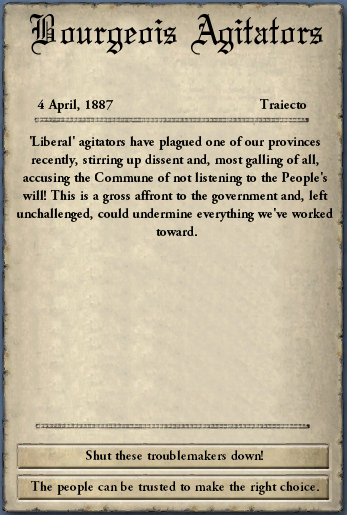 The new order wasn't without its critics. In a way, the spread of communal banking helped preserve liberalism in Gothia, providing a bourgeois case for the former republic's commercial and capitalist foundations. It wasn't a well-formulated argument, not yet, but it was through the post-revolutionary banking reforms of the mid-'80s that liberalism first regained its footing in the CCT. 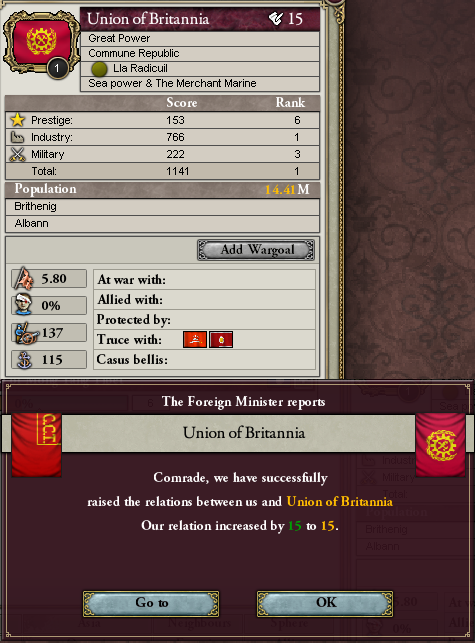 Revolutionary foreign policy, while willing to engage with non-socialist foreign powers, was still quite interested in shoring up the revolution and promoting a radical socialist spirit worldwide. It was natural for many Gothic revolutionaries to look across the Channel to Britannia, where revolutionaries had succeeded in reestablishing a Commune Republic, after their first one rose and fell in the 1860s. Britannia, one of the great industrial leaders of the world and the senior of the two neighboring revolutionary republics, was expected by many socialist Goths to lead the way towards a revolutionary future, with Gothia itself working as a partner in their endeavors.  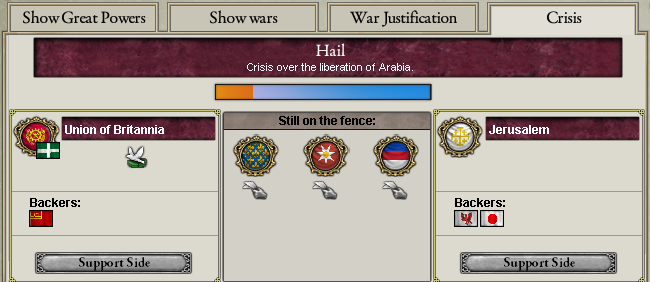 As part of this shift towards a stronger relationship with the Union of Britannia, in the autumn of 1887 the Confederated Communes joined the Union in an effort to secure Arabian independence from the old Crusader kingdom of Jerusalem, one of Gothia's former old allies. 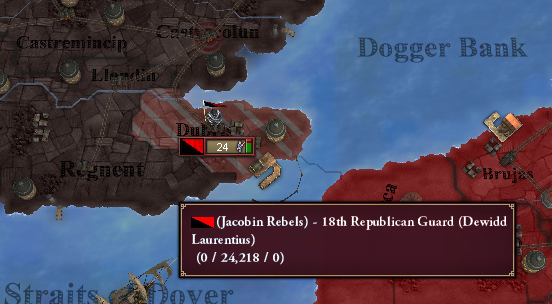 Gothic hopes to align with Britannia through maneuvers like these were dashed by Britannic domestic affairs, however. A series of mismanaged economic reforms and the withdrawal of the radicals from the governing coalition led to mass protests and armed uprisings. The Union of Britannia's army refused to take action against the protesters, and the communal government seemed as riven by internal power struggles as it was by domestic unrest. 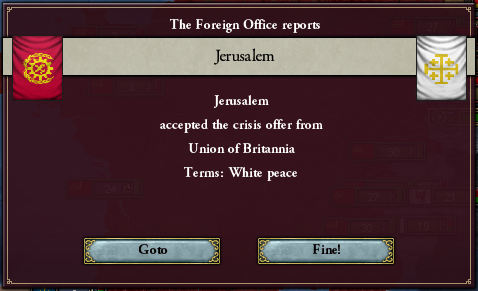 In this atmosphere of reform and collapse, Britannia backed down from its own position in the Arabian Crisis of '87, leaving Gothia with nothing but a ruined relationship with Jerusalem. 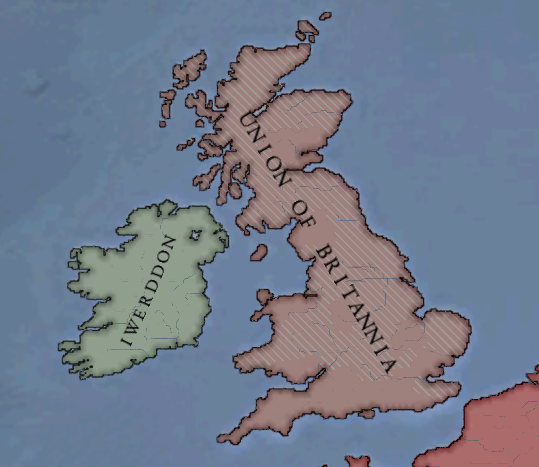 Britannia, for its part, continued to slide into chaos through 1887 and 1888. 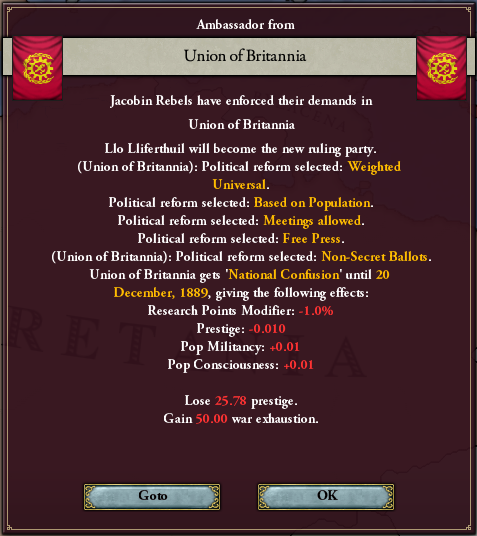  On December 21st, 1888, the collapse was completed, and the old Liberal Party of Britannia declared itself the new and sole government of Britannia, with the old non-socialist constitution restored. The sole goal of the CCT's foreign policy had ceased to exist.  As the 1880s drew to a close, the Anarchists called the first national elections. No nationwide vote had been held since the Revolution of '85; the Anarchists, ironically, had governed without a strong democratic mandate. 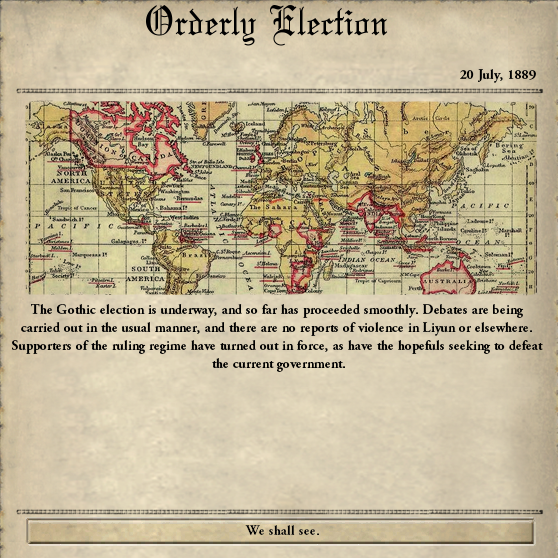 Despite the CCT's fumbles in the realm of foreign policy, domestic affairs had been relatively calm, and this calmness carried on into the election season. 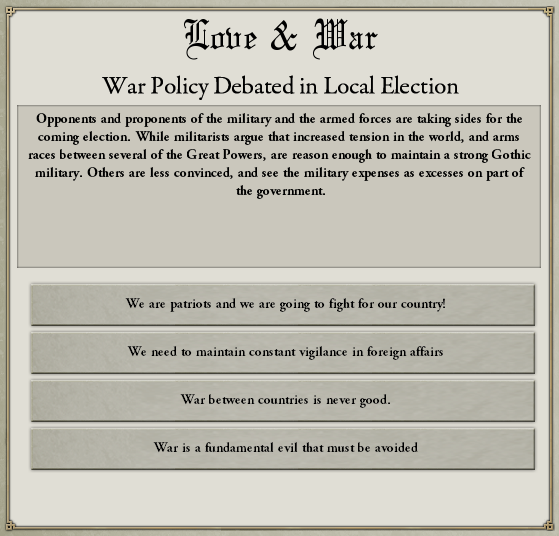 There were few topics that were truly contentious nationwide during the season; the anarchists and radical socialists in particular were largely aligned on matters of trade and citizenship. Their attitudes on war differed only slightly; the anarchists hewed to a true pacifist line, while the socialists maintained that a defensive military was a necessity while Gothia's neighbors remain opposed to an international proletarian order. Anarchists had implicitly acknowledged that goal already, having tolerated the existing army in the wake of the revolution and taking no steps to dismember it.  With such a convivial atmosphere, the outcome of the first communal elections scarcely made any waves. The anarchists won a majority of the votes, maintaining leadership in the CTT's government, but the socialists won a significant minority of the votes. The communists, still marred and divided by their suppressed insurrection in 1885, won only a few marginal seats.  A fresh electoral mandate, however, did give the anarchists the confidence to pursue one international issue they had held off on while they had tried to stabilize the commune republic's domestic affairs in the 1880s. 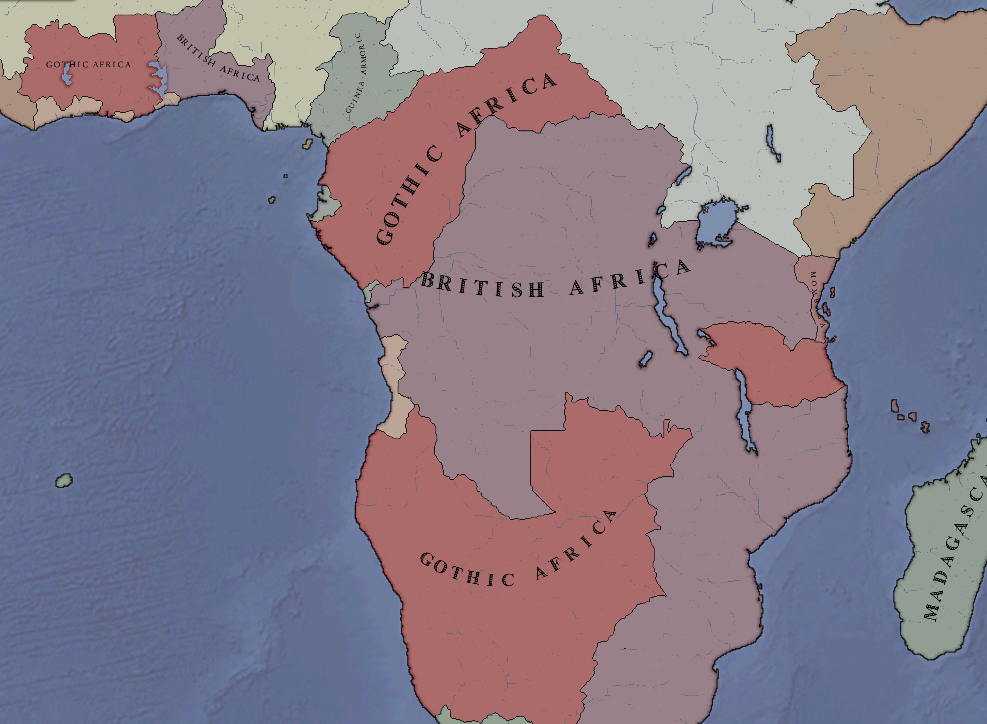 The CCT had inherited the Republic of Gothia's colonial empire, and had done very little to alter the republic's imperialist policies overseas. A few of the old republican governors even managed to retain their posts for years after the revolution; the anarchists refused to establish any sort of 'colonial ministry', and tried to engage as little with colonial affairs as possible. If anything, this enabled further colonialism, notable when the governor of South-West Africa sent a mission around the Cape of Good Hope and proclaimed a new protectorate along the Zanj Coast in 1887. The CCT's post-revolutionary dithering colonial policy had, if anything, enabled more of the sort of imperialism that its leaders professed to oppose. The election of 1890 gave the anarchists the political strength and impetus to finally change that policy. 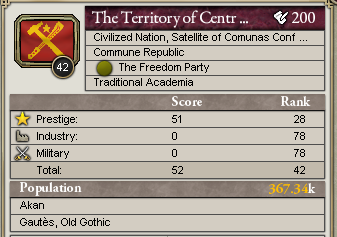 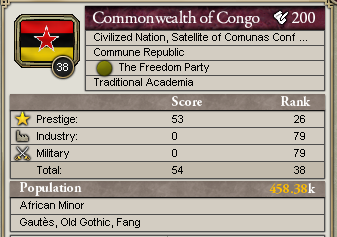  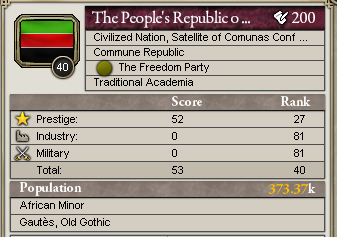 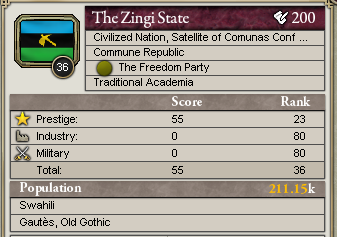 In a series of sweeping reforms, the CCT announced in May of 1890 that Gothia's old African colonies were to be organized into four 'autonomous federations':
The CCT maintained influence - anarchists vehemently denied any continued “control” of the former colonies, despite all evidence to the contrary - over all four of these federations, largely through the presence of political officers sent to oversee deliberations in the new governments. It was realized, belatedly, that the African federations had little class consciousness within them, particularly in the young Zingi State. The polities forged by the Goths were just the continuation of the old colonies, in a way, and there weren't any major internal forces interested in maintaining the new order the CCT wished to promote. These difficulties prompted the colonial reforms to stop with Africa for the time being- the Gothic East Indies remained under the CCT's direct administration, much to the chagrin of Gothic anarchists. 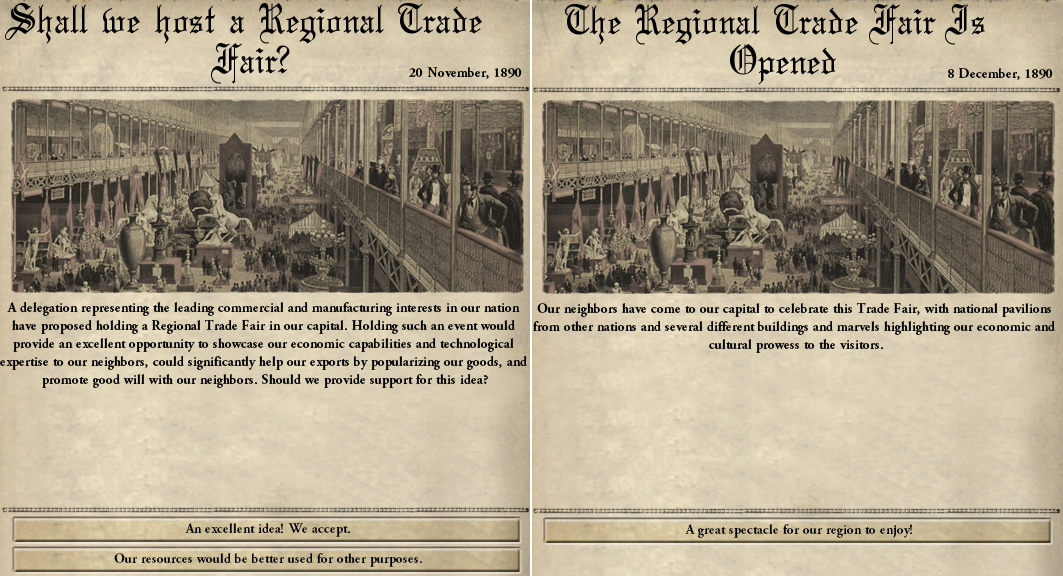 The awkward ideological complexities of the CCT's colonial reforms were lost on the general Gothic public amid a growing sense of stability and prosperity at home. The CCT had managed to survive the first years of its existence intact; it had begun implementing social reforms long-desired, instituted a new political order that had not immediately collapsed, and, importantly, it had brought some sense of peace to Gothia. The new government fumbled on many issues, but it did not collapse. The Revolution had survived. The world, January 1st 1891 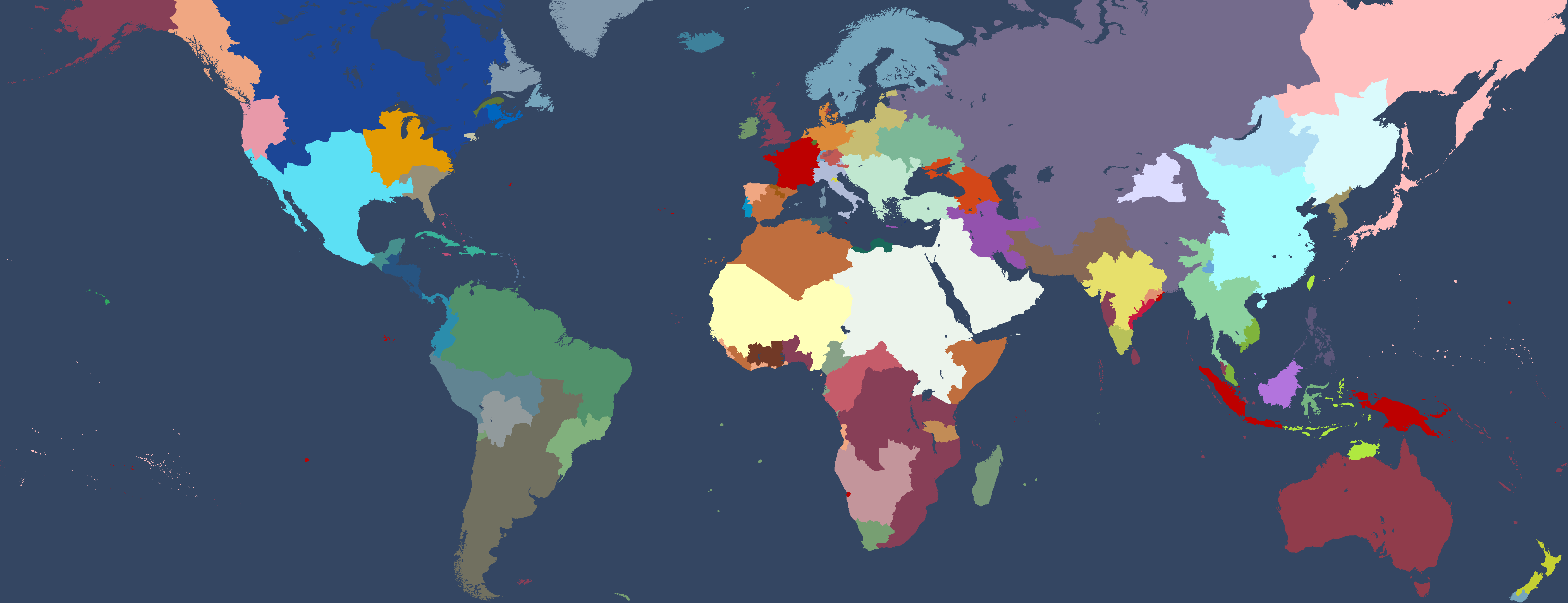
|
|
|
|
The gothic people sleep dreaming of peace and prosperity while all I can see is that giant Great Old Bulgaria forming an encirclement on the indian subcontinent
|
|
|
|
Hooray for anarchist politicians winning elections to control the state!
|
|
|
|
Yeah I am not an anarchist but I am not sure if this is how it is supposed to work.
|
|
|
|
 The anarchists don't have absolute power. There's still a bunch of non-anarchist socialists and Marxist communists around and involved in the revolutionary government. tbh it's something I've been struggling to reconcile, what are anarchists supposed to do if they're in a revolution with people who like states? The anarchists don't have absolute power. There's still a bunch of non-anarchist socialists and Marxist communists around and involved in the revolutionary government. tbh it's something I've been struggling to reconcile, what are anarchists supposed to do if they're in a revolution with people who like states?
|
|
|
|
I'm like 90% sure something this rear end backwards is how it would actually happen tbh. The game just can't handle statelessness or the rise of non-state organizations supplanting its role without the mechanics of a nation-state anyway so this is fine, just funny af
|
|
|
|
Yeah it's probably as close as Vicky 2 could get.
|
|
|
|
Honestly no revolution is ever clean and having a clear central divide in the central institutions of power makes things more interesting. Will socialists oppose anarchist proposals? Will the army eventually become loyal to a socialist or communist party because of the anarchists' lack of interest in the institution? Will things end up in purges once the country finds itself in crisis again? A lot of things can happen, and most of them appear interesting.
|
|
|
|
Hellioning posted:Yeah I am not an anarchist but I am not sure if this is how it is supposed to work. Ofaloaf posted:
I'm an Anarchist, and one specifically inspired by Proudhon's Mutualist framework, so let me take a stab at this one: There's a lot of variance of opinion amongst Anarchists as to how to proceed with a stateless society, but the core contradiction is similar to that of Communism - unless it is world-wide and universal, it isn't really Communism as defined by Marx, it's Socialism. Gothic Anarchists are probably looking at Proudhon in the same way that Lenin looked at Marx - yes, this is the ideal and we should organize our societies along his prescribed Economic lines (Unions, Mutual Credit Banks, Worker's Communes, Stewardship as Ownership), but real Anarchy is impossible until all states have been dismantled, otherwise the Franks will just invade and impose their ideology. The crux of the issue is how active to be about that, and that's where I see these three Left-Wing factions forming their divisions. The Anarchists don't want to impose Anarchy on the other states of the world, they just want to create a zone in which themselves and other Anarchists are free to live the way they want. So they would support a volunteer military defending that zone from states, as well as a consensus based government to administer the benefits of society. The Communists would likely also call themselves Anarchists (like a lot of IRL Communists do), but want to spread the Revolution so that real Anarchy can happen, where there is no need for a volunteer military or markets or any of the compromises that those other Anarchists are willing to give. But in order to achieve that, there must be either permanent revolution or a vanguard party and... we all know where this goes. The Socialists see the intrinsic conflict here and say, well, we're going to have a State no matter what for the foreseeable future, so why don't we just focus on making that State the best place possible to live. The reason the Anarchists and Socialists vastly outnumber the Communists in Gothia is likely because the Communists are asking for maximum State Control now in exchange for possibly no State Control later, while the Anarchists and the Socialists are arguing about how much State Control to have right now. War-weary Gothia already doesn't want to export the Revolution, so the Communists probably seem literally insane to most. TL;DR The Anarchists see Gothia as a giant long-lasting TAZ (Temporary Autonomous Zone), the Socialists are trying to turn it back into a proper state, and the Communists want to harness it to take over the world.
|
|
|
|
Chapter 84: The Watch on the Rhine 1891-1897 The Confederated Communes was confronted with the most direct challenge possible to Gothic lands, forcing leading anarchists, embroiled in crisis, to confront the compromises they had made and continued to make.  The CCT had been led through its formative years by anarchists; a mere month after the declaration of their revolutionary government, they had broken their principles of non-coercion to violently suppress a faction of communists intent on seizing power themselves, but following this bloody and compromising start, they had focused on enabling better welfare for Goths and dismantling the Gothic colonial empire abroad. The “founding sin” of the CCT, however, continued to haunt the anarchists and drive a deep wedge into the heart of the Gothic anarchist movement, causing their support to falter in the 1890s. 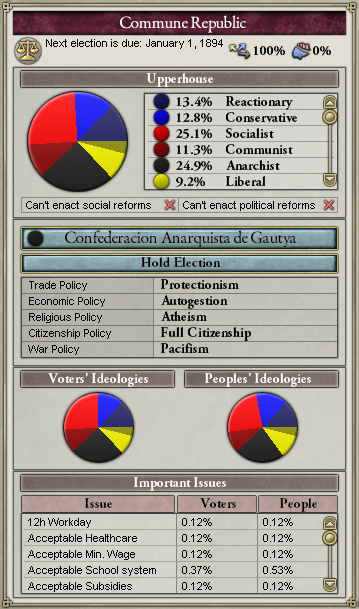 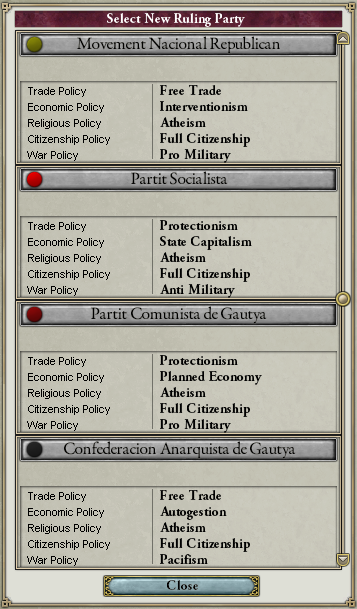 The decline in anarchist popularity did not mean a decline in revolutionary support – radical socialists enjoyed as much support as the anarchists proper, and the communists still managed to maintain a respectable following among the workers. The liberals and conservatives together, still reeling from the collapse of the bourgeois republic, failed to muster a majority between all their moderate and radical followers. 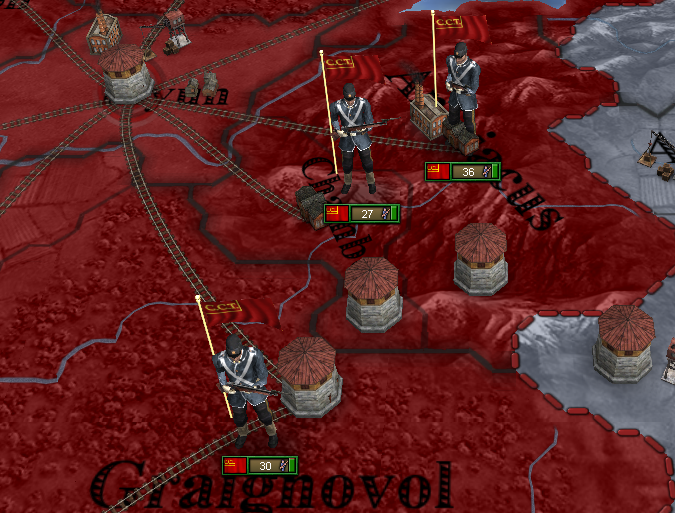 Moreover, the military still kept its arms as the “Autonomous Federation of the Army”- the anarchists' policy of elected officers drove away many of the most senior military figures, but it helped boost retention in the lower ranks. Although anarchists swore that an army would only ever be used to defend the revolution from foreign reactionaries, socialists within the government quietly counted on this force to address any domestic unrest as well, and communists did not easily forget the bloody days of 1885. 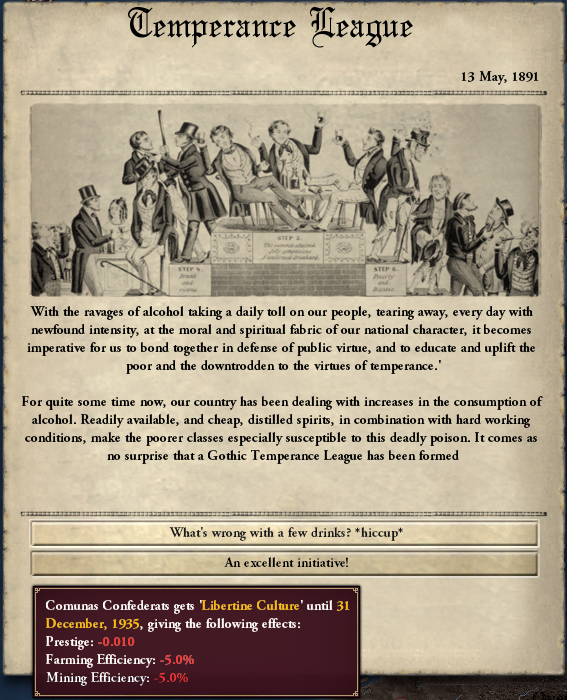 Anarchists still flexed their influence where they could- an effort to push for national prohibition was shot down quickly by the Anarchists in the CCT's council chambers.  Anarchists were being increasingly ignored elsewhere, however. Socialists and communists worked together, over the objections of the anarchists, to establish an alliance between the CCT and the vast North American realm of the Pequots during the summer of 1891. Many other revolutionaries objected to this alliance - Pequotia was a kingdom, after all – but were ultimately rebutted with the argument that “we should ally with anyone who will do good” - that is, assist the CCT - “as long as we never aid someone doing evil.” While this was derided as both wildly naive and wildly cynical, the move carried the day and the Goths established a new alliance with the Pequots. 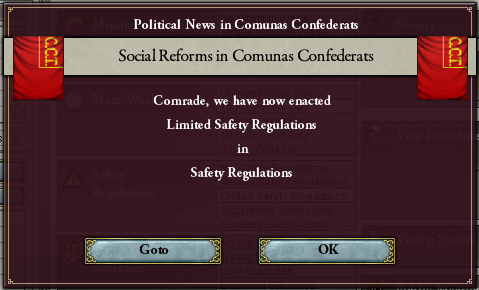 The revolutionaries continued to work as one when it came to matters of social reform. Worker oversight committees were introduced in most major factories over the course of late 1891. Although industries were increasingly self-managed, there were still concerns expressed within the major unions that factories might disregard safety for the sake of production even when fellow workers were in control, and this concern had led to the establishment of union-organized 'safety syndicates' that were intended to inspect and adjudicate issues related to workplace safety, keeping factory councils in check.  1891 also saw the introduction of a reliable two-stroke internal combustion engine in Gothia. First invented in Britannia to the north, the two-stroke engine was then a small, sputtering device, widely mocked by Gothic mechanists and mechanics as a loud and ungainly novelty. 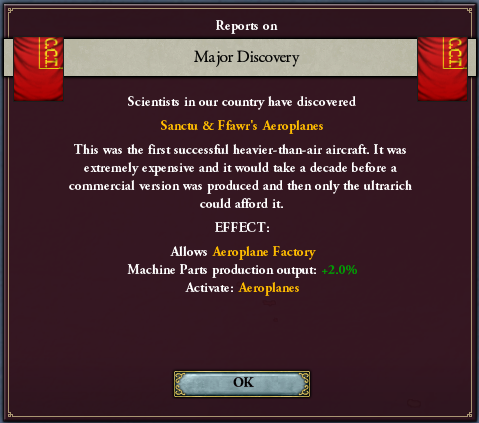 That changed on February 19th, 1892, when news of the first heavier-than-air flight – also Britannic – was announced to the world. Fanciful stories of future men flying all sorts of devices proliferated periodicals and anthologies in the following months, but the Gothic public's fascination with the novelty crashed on April 19th.  April 19th, 1892, was the day the Kingdom of Francië declared war on the CCT once more for the provinces on the Rhine that bordered the Frankish realm. The royal council had decided to strike in part because the CCT's standing army – the anarchists' “Autonomous Federation” – had not grown in size even as the Frankish had continued to expand their armed forces, leading to a far greater disparity in military power in 1892 compared to 1885. The Franks had also forged a stronger alliance with the Kingdom of the Romans in Italy and with the Bulgars of the Volga to create a “Tripartite Accord” between the three countries, a formidable constellation of Eurasian states. 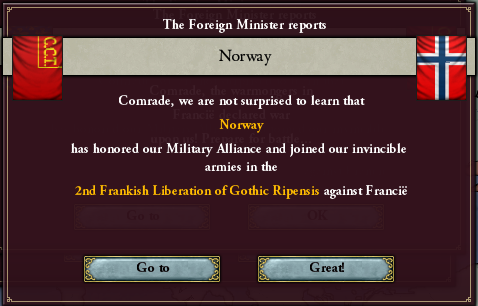 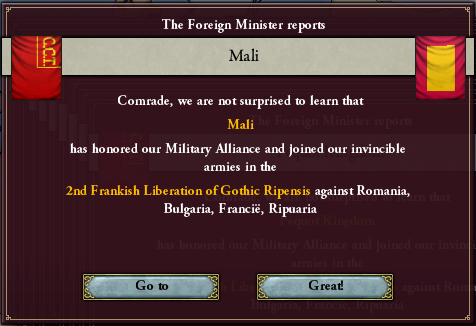 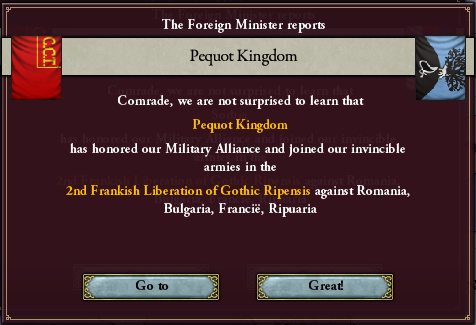 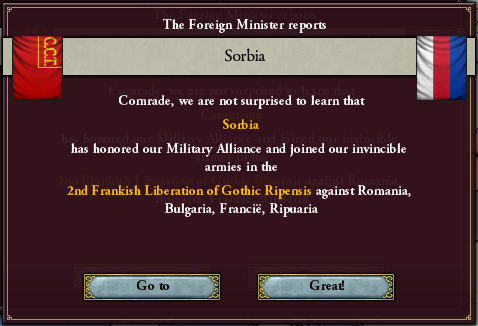 The Goths, for their part, did not experience a repeat of the Gothic Republic's diplomatic failures in 1884, and received the full backing of all its allies. American, European and African allies all followed through with their defensive agreements and backed the CCT in this war.   With so many nations embroiled in the conflict, it soon became obvious to observers that this war was going to be something different. This war would draw upon industry and blood from across the globe; this war was the Great War.  The situation of the war in Europe was a confused one. Many of the participants were wedged between enemies; Bulgaria had fronts with Norway and Sorbia, Norway had fronts with Bulgaria and with Francië in the Danish archipelago, Sorbia had Francië to the west and Bulgaria to the east, Romania had the CCT to the northwest and Carantania straight north across the Alps, and the CCT had a long border with the opposing states of Francië, Romania, and the minor country of Ripuaria. The war was going to be a mess. 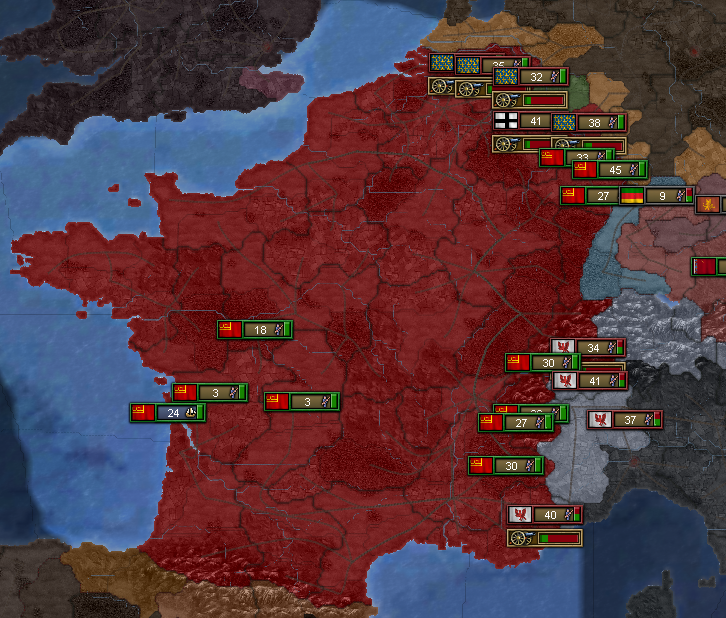 Francië's declaration had caught the CCT off-guard, and the first moves of the war had been a general advance by Tripartite forces into Gothic lands. The war council of the CCT's Autonomous Federation called for the standing forces to be concentrated into Frankish and Roman armies, to combat intrusions on both fronts simultaneously. 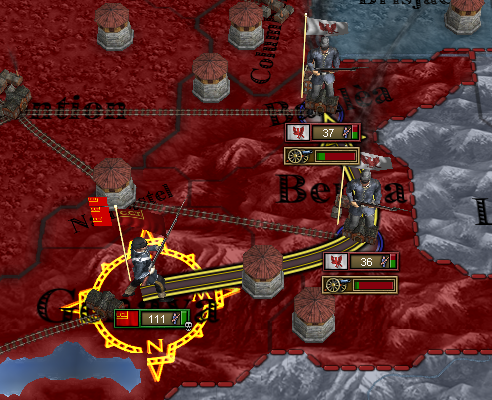 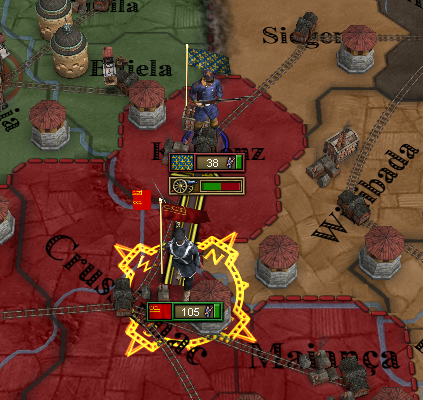 The armies consolidated shockingly fast. By the end of April, just two weeks after the onset of hostilities, the Autonomous Federation had managed to concentrate a sufficient number of men in the northern and southern fronts to issue orders to advance. 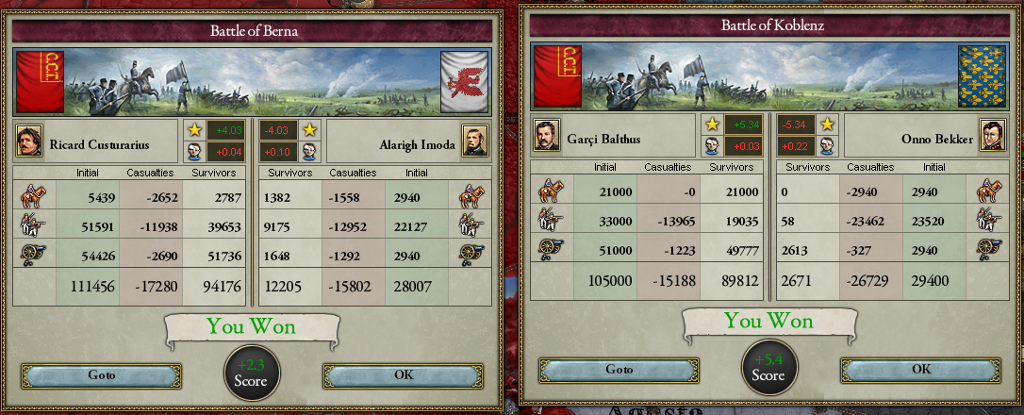 Both advances resulted in victories, although considering the disparity in numbers it was concerning how many men were lost. 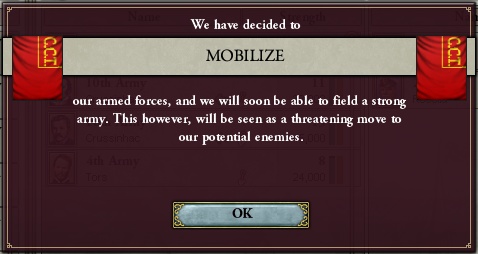 At the same time, the CCT issued a general call to arms. “Every man must do his duty to protect his commune” was the message sent across the nation. 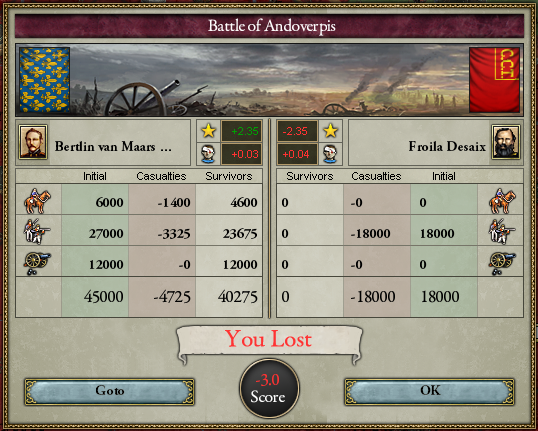 Mass mobilization was not nearly as well-organized as the Autonomous Federation's actions had been; a whole cohort of freshly-mobilized men was captured near Andoverpis in late May, in one of the most major failures of the mobilization.  The Federal armies continued to win their own battles, but losses continued to be lopsided as well.  The only positive for the defense of the CCT was the discovery that the Franks were also less organized than the country that started the war should have been. Mobilized pools of men were also caught by Gothic troops and likewise taken out of the conflict with little struggle. The capture of twelve thousand Franks outside of Trevèri was widely hailed as revenge for the embarrassment at Andoverpis, although the Franks still came out ahead in terms of numbers when comparing the two incidents side by side. People who brought this up while discussing the news were often told to shut up, however. 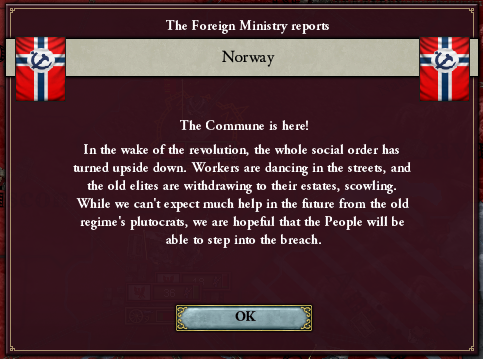 A surprising development in these early days of the war was Norway's fall to socialist revolutionaries. While Norwegian troops were fighting at the fronts on the side of the CCT, socialists took advantage of the lack of troops in the capital to stage a coup, overthrow the monarchy, and declare a new communal republic. If anything, this increased Norway's commitment to the war, making the Norwegians and Goths ideological brothers in the struggle. Likewise, it bolstered the confidence of the CCT, giving some vague hope that Norway heralded the first rumbles of the international workers' revolution many Gothic socialists still hoped for. 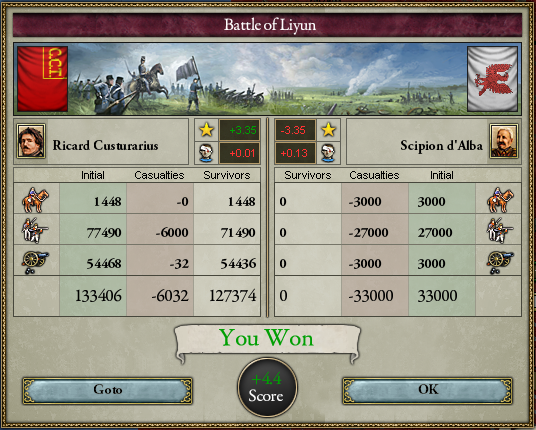 As the summer of 1892 rolled along, the Tripartite advance on the CCT ground to a halt. The first major advance on the outskirts of Liyun was roundly defeated by the southern Federal army on July 20th. The southern front was checked for the moment.  The Federal army's rapid organization and the experience of mass mobilization had begun to trickle down into the writings of military theorists and the official quarterlies of the quartermasters. To house people, move arms, supply munitions – logistics, that was the subject living rent-free in the minds of the Gothic military. 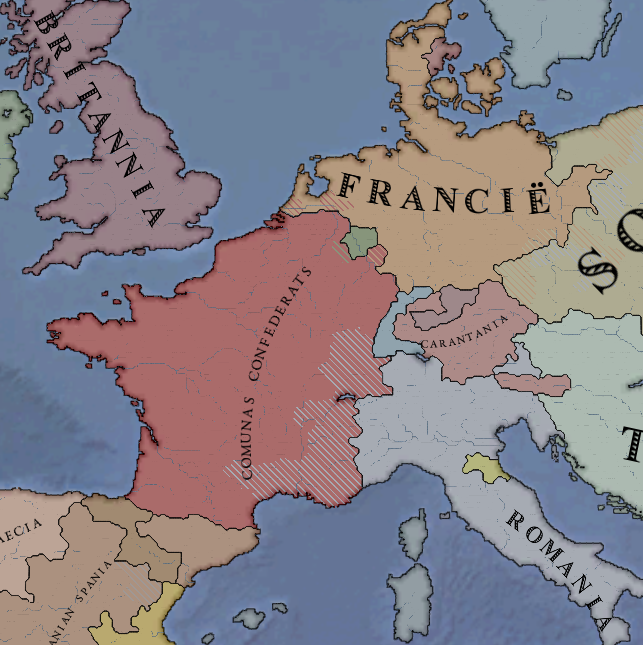 By the end of the autumn of 1892, the situation had evolved in quite distinctly different directions for the CCT's northern and southern fronts. In the north, the Frankish advance had been checked, and some minor gains had been made on the Frankish side of the Rhine. In the south, however, the army struggled to find its footing, even briefly withdrawing from Liyun itself at the end of November.  The Gothic army in the south, it should be noted, wasn't failing to win battles – far from it! - but the Kingdom of Romania spread its forces out and reinforced them faster than the concentrated Goths could defeat them piecemeal.  And abroad... frankly, not much happened in 1892. The Tripartite alliance was solely in Eurasia; support for the Goths in Africa was useful in the diplomatic field, but opened up no new fronts for combat. 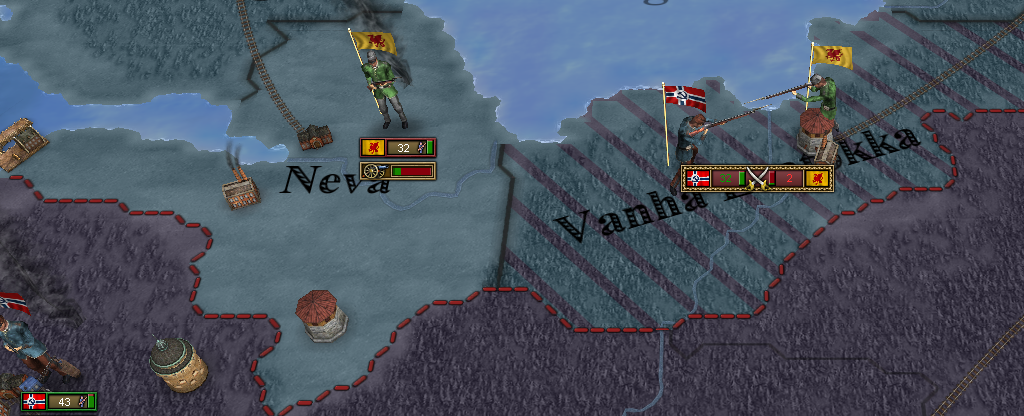  The situation was different in Europe. Norwegians and Bulgarians fought over the winter of 1892 in a wretched stalemate right at their shared border, and the Sorbian front remained a chaotic mess of forays to and from Francië and Bulgaria running east and west constantly.  The other significant development of the winter of 1892 was the CCT's realignment of the Kingdom of Mauretania, to the CCT's south, with Gothic interests. The fear of a Pyrenean front opening up had been a widespread one among the Goths; most diplomatic capital from the start of the war to the end of the year had been spent bringing Mauretania around to a state of friendly neutrality, or even an alliance. 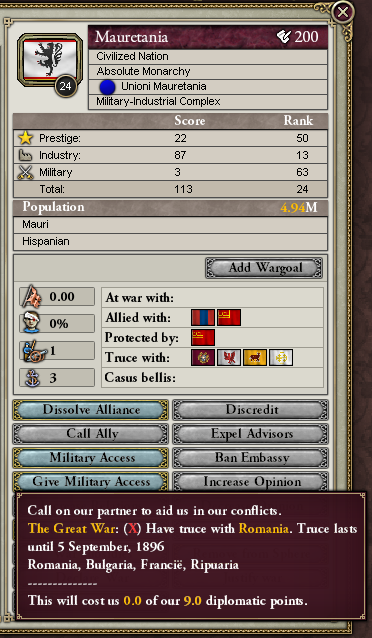 Mauretania wouldn't let itself be called into the Great War though, at least not yet. It had recently suffered a separate defeat at the hands of the Tripartite belligerents, who had forced the North African kingdom to grant independence tp a fragment of its Iberian holdings as the price of peace. No Mauretanian diplomat was willing to commit his government to war again so soon after such a defeat.  Despite this refusal to join the war, Mauretania's “alignment” proved to be even more effective than Gothic diplomats had expected when, in an echo of Norway's coup, Mauretania succumbed to socialist revolutionaries in January of 1893. Perhaps it really was time for the world revolution? 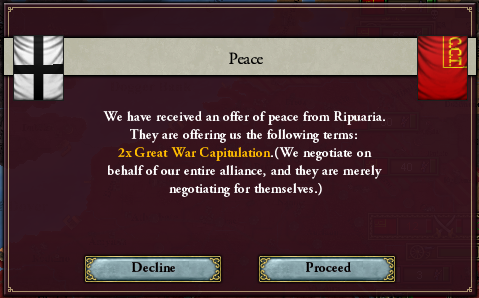 Hopes for the war soared further when Ripuarian officials first began seeking peace terms in early 1893. It reinforced attitudes that victory was just around the corner; the soldier delegates from the Autonomous Federation, emboldened by the Ripuarians' defeatist stance, pressed the CCT council hard to refuse any call for peace until they won “the big one”. 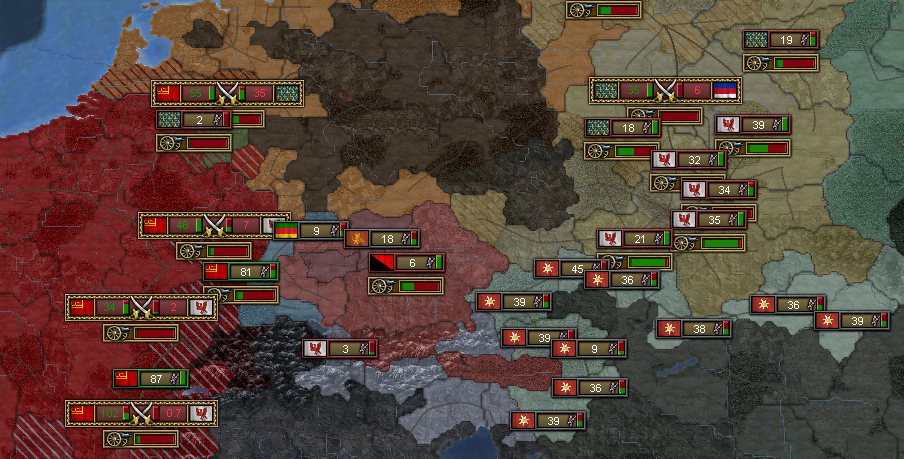 1893 was much like 1892, although the tide was clearly about to turn. The Frankish offensive was completely out of steam, and the Frankish army itself was visibly depleted. In the south, Romania could still boast about occupying significant portions of southeast Gothia, but the Romanians too were running ragged with their military, and it was unclear how much longer they could maintain their own offensive. The east was faring much worse, as the Sorbian military was collapsing even more quickly than Francia's or Romania's. Depleted Tripartite armies were still more than a match for Sorbia, and the country found itself slowly being occupied. It was rumored that the Sorbians were, like the Ripuarians, seeking separate peace terms. 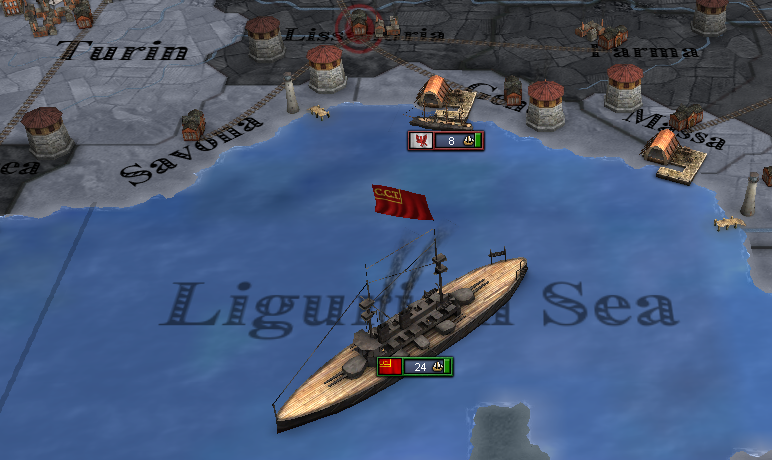 Naval combat was even more lopsided in the favor of the Goths. The CCT had managed to inherit most of the old Gothic Republic's fleet, and a handful of communes with major drydocks had even contributed to the fleet after the revolution. This array of ships, like the northern and southern armies, was concentrated into a single fleet and sent on a variety of missions in the Mediterranean over the course of 1892 and 1893. Romania, the main opposing presence in the region, refused to challenge the Gothic navy directly, resulting in the CCT's fleet blockading the Italian coastline almost unopposed. 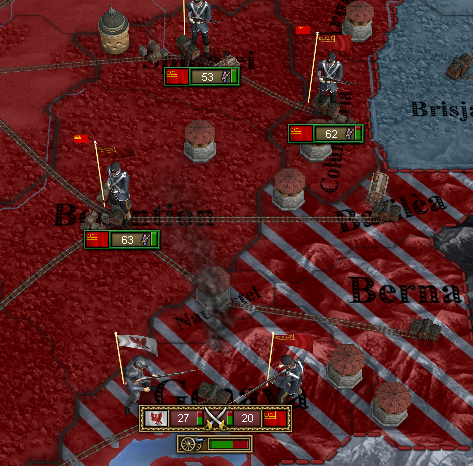 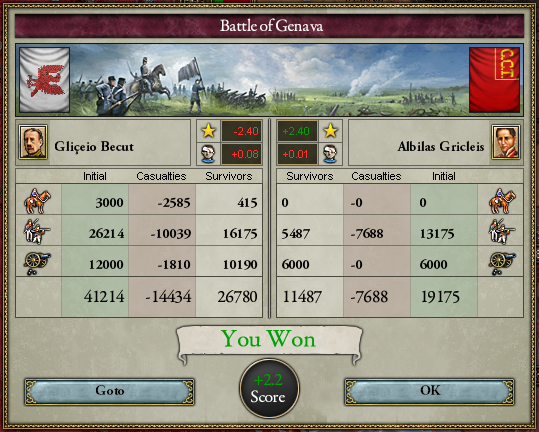 In the late spring of 1893, the southern army finally initiated a grand offensive against Romania. Romanian troops were clearly exhausted, and attrition had whittled down their manpower considerably. In May, Gothic troops began assaulting tired Romanian positions in the Alps.  And by early July, army units had successfully broken through enemy lines and begun sieges of north Italian cities, including the Romanian capital, Lissandria. 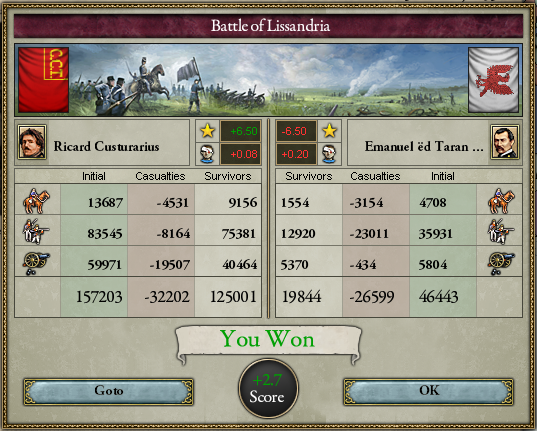 Romanians attempted to repulse the Goths, but in a series of bloody battles, they failed to dislodge the besiegers despite inflicting heavy casualties. 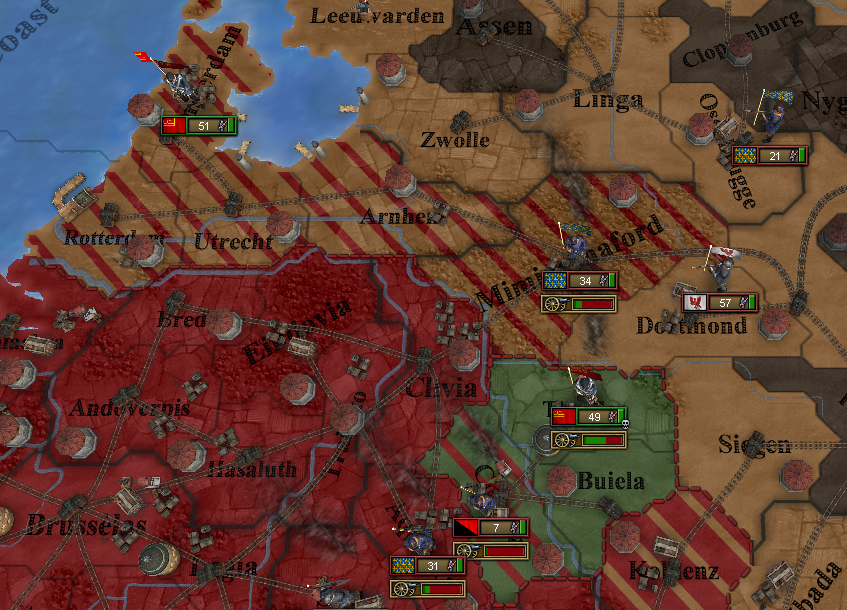 Fortunes were reversed in the north, where the Gothic advance against the Franks stalled as veteran Frankish troops, fresh from the newly-ended Sorbian front, arrived at the Rhine just as the Goths began to spread out to further advance into enemy territory.  Gothic organization in the north had nosedived as the CCT's troops had advanced; support had not been evenly distributed among the corps, and some units remained nothing more that mobilized volunteers armed with nothing more than repeater rifles. The results were bloody when these soldiers finally came into contact with the Frankish military. 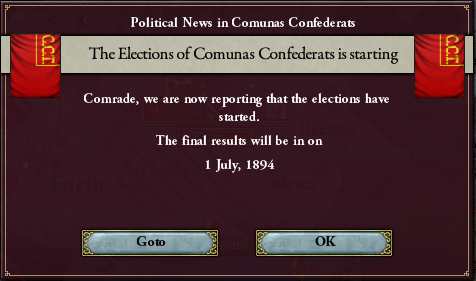 In the shadow of these stalled advances and severe battles, communal elections began across the CCT.  National attitudes towards the anarchists were mixed. The idea of turning Gothic lands into the first autonomous zones of an international anarchist movement had lacked appeal for many people from the beginning. The necessity of political cooperation and compromise with socialists and communists had meant that the Confederated Communes was, despite the protestations of leading anarchists, clearly a state, albeit one that favored decentralization and workers' rights more than most. The ideological foundations of Gothic anarchism were undermined from the start, and the popularity of anarchism was never as widespread as anarchists themselves had hoped.  Counterbalancing this, the anarchists had successfully navigated the CCT through a decade of turmoil intact. Social progress had been made. The material conditions of most Goths had improved considerably since the Revolution of 1885. In terms of war and bloodshed, the anarchists were largely perceived as faultless- the Great War was not the their doing, and the Autonomous Federation's efforts to protect the communes were commendable.  This mixed legacy meant that the anarchists' position in the CCT was very much up in the air. It wasn't clear if people were content with pacifism in the midst of a war on their doorsteps, or if people really cared first and foremost about workers' self-management while bombshells whistled overhead. 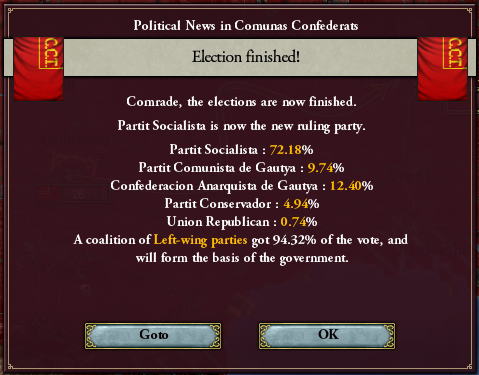 Ultimately, the communal elections revealed a collapse in anarchist support. The Socialist Party surged in the polls and won a comfortable absolute majority of seats in the communes, forming their own wartime government. 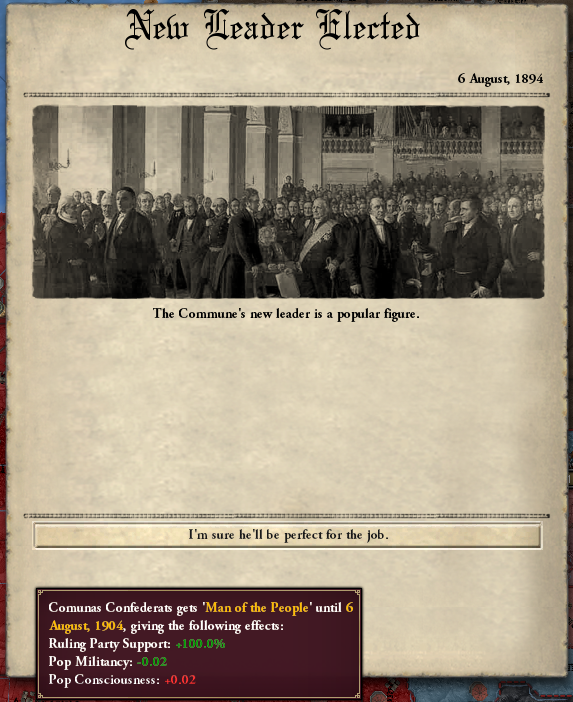 With the new socialist government came new leadership. Atalaric Rispal was a charismatic figure from the lower Léger River valley, and quickly became the leading figure within the Socialist Party after the elections of 1894.  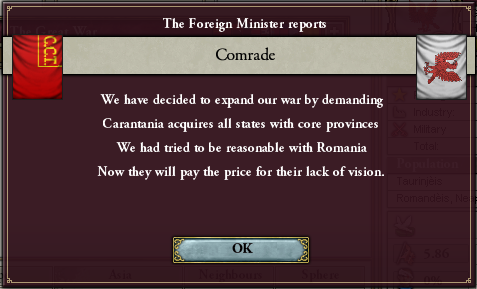 Comrade Rispal, and the Socialists overall, were far more willing to commit to aggressive goals than the anarchists had been. One of the first policy shifts of the Socialist administration was to proclaim the Great War as one of “liberation” - although the Socialists shied away from direct conquests, they had no problem with doing what they could to deny Romania and Francië territories.  And by the autumn of 1894 it seemed possible that Comrade Rispal might get what he wanted. The Frankish front was more nebulous and elastic than ever, and the Romanian counterattack in the south was proving to be a desultory, anemic affair. 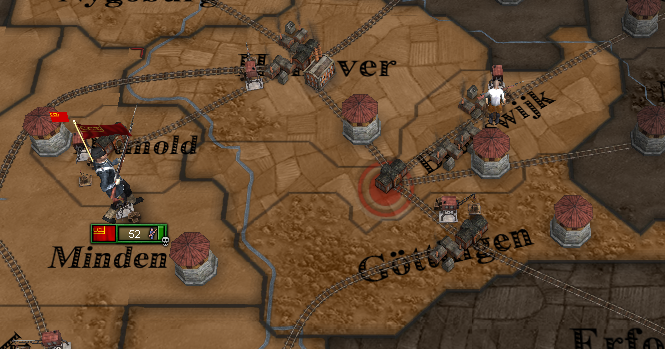 In the north, Frankish lines were so weak that a portion of the northern Gothic army made a bold run straight for the enemy capital of Brunswijk in mid-September, their advance completely uncontested.  Meanwhile, the counterattacks in the south failed to dislodge the Goths from their positions. Romanian armies were increasingly feeble.  The Franks weren't just facing pressure from the Goths, either. Norwegian forces began to advance across the Danish archipelago towards the Frankish mainland. Although the Franks sent one of their few remaining intact armies north to stave off the attack, the Norwegian navy arrived just in time to trap them in the city of Odense over the winter of 1894. 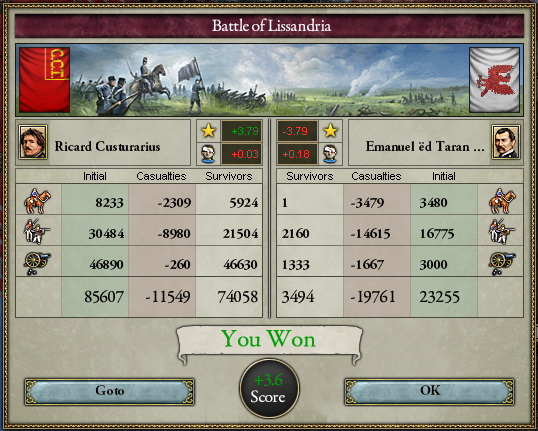 Fresh assaults against Lissandria in early 1895 continued to do nothing to shift the Gothic army, but they did continue to whittle down the size of the Romanian military. 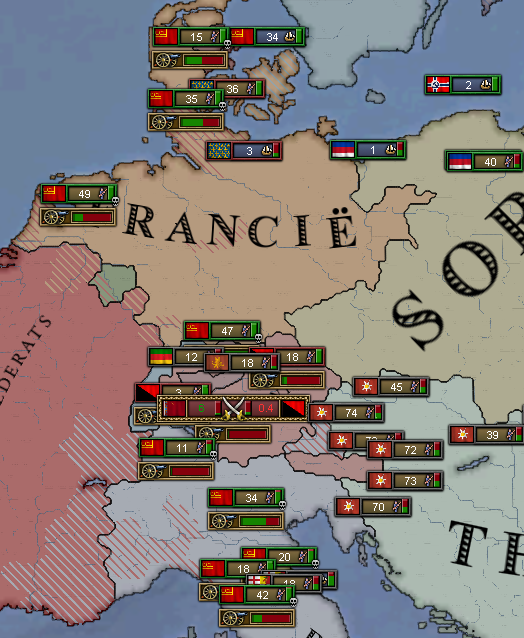 The Romanian army was weakened sufficiently by the summer of 1895 to create breakthroughs in the south like the ones Francië had experienced the year prior. Gothic troops were running across both countries uncontested, targeting the most industrial Tripartite cities to destroy any wartime manufacturing.  Yet despite this clear swing in favor of the Gothic alliance, the Tripartite Accord refused to give in to the CCT's demands. The cost of freeing Danish and Carantanian territories was still a price the Accord was unwilling to pay for peace. 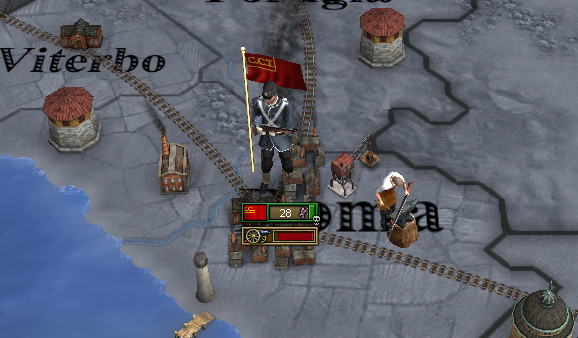 Seeking to bring extra pressure to bear, a Gothic army was dispatched to capture the city of Rome, still politically significant despite not being a capital.  Just as this final campaign went underway, the Goths received surprise support from the Pequots, who landed detachments in northern Romania and proceeded to secure some of the more minor cities that CCT forces had ignored in their pursuit of Romanian armies and Romanian manufacturing centers. 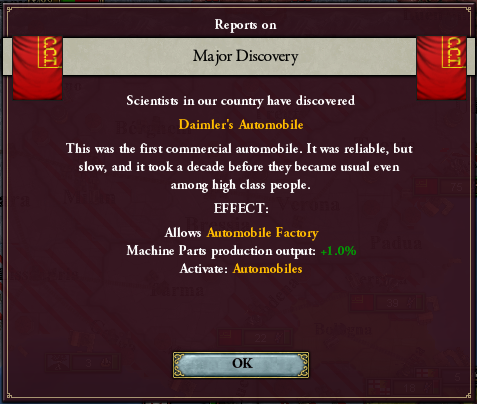 Another change unremarked upon in this last stage of the war was the introduction of the automobile in Gothia. Although it took no part in the war, the automobile signified a major advance in the design of the internal combustion engine. Petroleum-fueled motors proliferated in the mid-1890s, not just in the early automotive industry, but also in the further development of heavier-than-air and lighter-than-air aircraft. Motorized dirigibles saw some use in the war as fast couriers of delicate material over the Alps and as observation balloons. During one of the 1895 Battles of Lissandria it was alleged that hand grenades were dropped from an airship for the first time – the first bombing run. 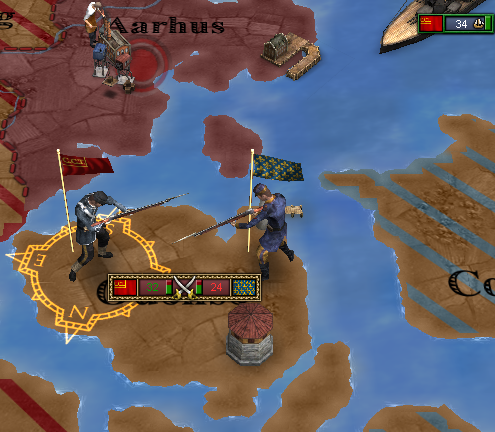 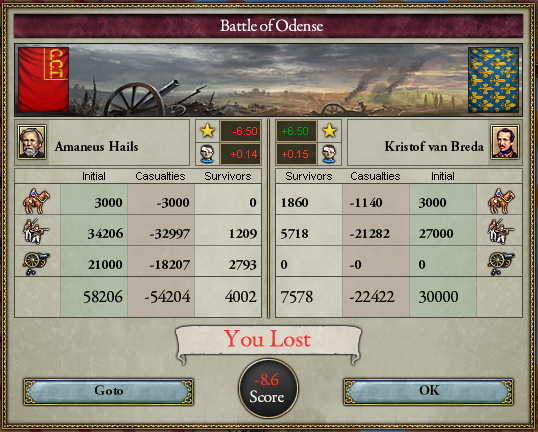 The Goths suffered one last defeat in the last days of the war with the March 1896 Battle of Odense. Although the Frankish army there had been pinned down by the continued Norwegian-Gothic blockade of the island, they were still well-provisioned, and the Gothic assault on the island faced undamaged coastal defenses, unexpected by the attackers. The bloody defeat reminded the Gothic military that the war was not yet won. 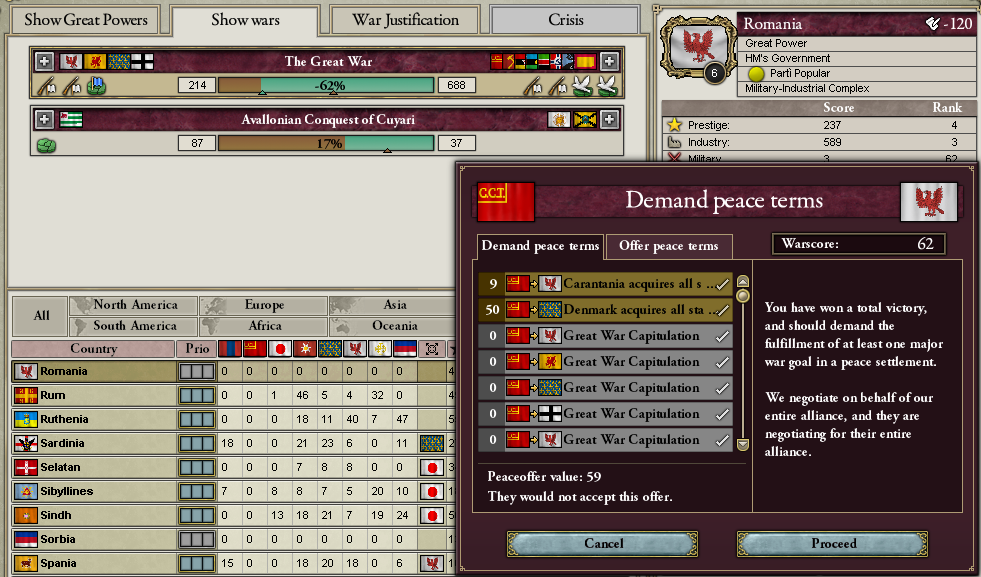 Buoyed by victories like Odense and maintaining an astoundingly stubborn attitude, Tripartite diplomats still refused to accede to Gothic demands over the course of 1896. Likely this was due in part to Bulgarian recalcitrance- although the Kingdom of Bulgaria had also suffered defeats, it had not endured an absolute collapse like Francië and Romania, and believed that a white peace, a “peace with honor,” was the only acceptable conclusion to the war. 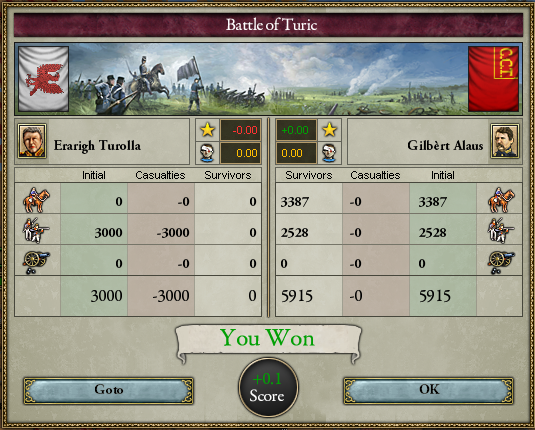 Minor skirmishes continued throughout 1896 and early 1897 as Gothic and Tripartite diplomats continued to debate terms for an armistice and peace, and Goths continued to make small but steady gains all the while. 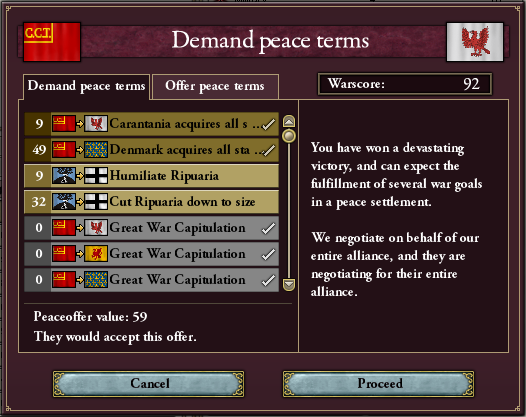 It was a combination of further gains and the addition of Pequot demands that finally compelled the Tripartite Accord to accept peace terms. The war was plainly lost, and the Gothic alliance's patience had run out - if the Tripartite Accord did not accept the Goths' original terms, more conditions would soon be added. 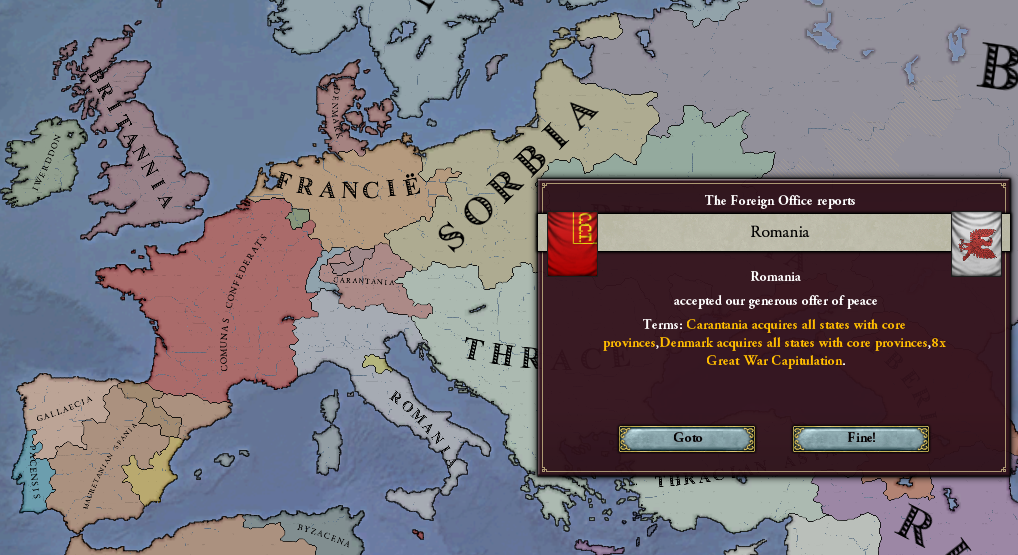 It was thus on June 1st, 1897 that the guns went silent and the Great War drew to an end. The Great War had transformed the Confederated Communes. The anarchist dream of an autonomous zone of peace and liberty had faded away; pressed by war, the CCT had armed itself, directed its soldiers into increasingly bloody battles, and joined hands other nations to forcibly impose terms upon its defeated foes. The Comunas Confederats dels Trabalhars had become a state to be reckoned with. The world, June 1st, 1897 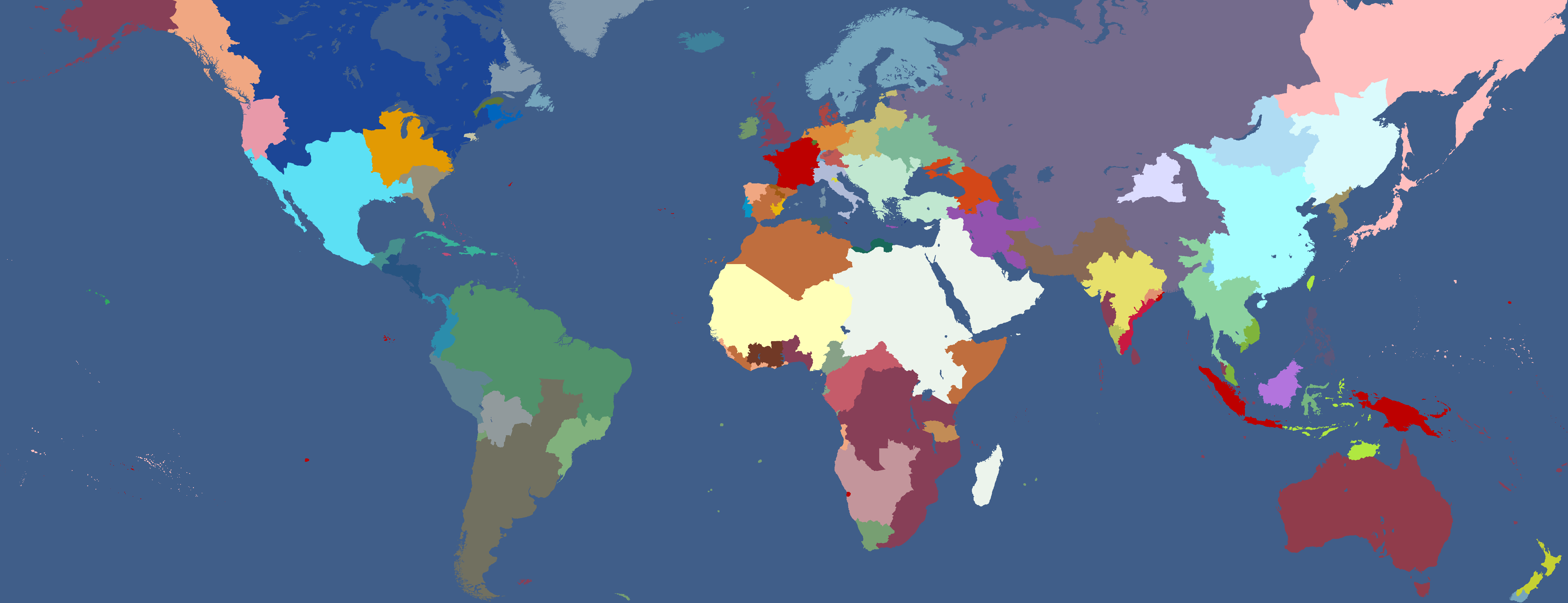
|
|
|
|
Glorious victory for the peoples and communes of Gothia!
|
|
|
|
Victory, but at what cost? We created an entirely new state!
|
|
|
|
Shout out to the Eastern Roman Empire, which is still lingering on in Persia
|
|
|
|
All that blood spilled, and for what? A couple mountain passes and a sandy shoal changing hands. Even worse, we're now fully recognized as a STATE! The revolution is dead and further backslides are all but inevitable
|
|
|
|

|
| # ? Apr 24, 2024 19:44 |
|
Over a thousand years later and the Franks are still trying to push west.
|
|
|


































